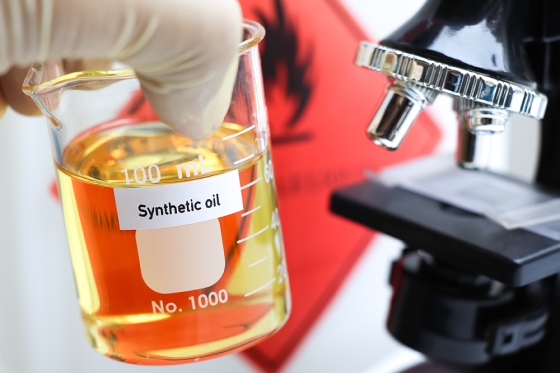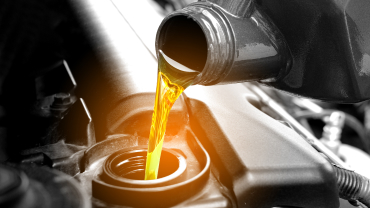What is the Difference Between Synthetic and Mineral Engine Lubricants?



What is the Difference Between Synthetic and Mineral Engine Lubricants?
Engine lubricant is a critical element for the performance and longevity of vehicle engines. When choosing engine lubricant, it is important to understand the differences between different types. In general, commercially available engine lubricants are divided into three main categories: synthetic engine lubricant, synthetic-based engine lubricant, and mineral engine lubricant. These types of lubricants are distinguished by different production methods and components. Choosing the right engine lubricant can both improve your vehicle's performance and reduce your maintenance costs in the long run. In this article, we will discuss in detail the differences between synthetic and mineral engine lubricants. We will also touch on issues such as engine lubricant prices and what semi-synthetic engine lubricant is.
What is Mineral Engine Lubricant?
Mineral engine lubricants are obtained by refining crude oil and are often enriched with additives. Preferred for their lower cost, such lubricants are often used in older generation vehicles. Mineral engine lubricants are a suitable option for engines that do not require high performance because they have a simple formulation. However, these lubricants have low resistance to temperature changes and may be insufficient to meet the requirements of modern engines.
Advantages of mineral engine lubricants include low prices and high availability, while their disadvantages include low thermal durability and short-life cycle. Thus, they are generally preferred in older model vehicles rather than modern vehicles.
What is Synthetic Motor Lubricant?
Synthetic motor lubricants are specially produced in the laboratory and offer high performance. Synthetic motor lubricants are more stable than mineral lubricants as they have a chemically designed structure and provide effective protection even in extreme temperatures. Such lubricants are ideal for high-performance engines and harsh operating conditions.
Advantages offered by synthetic engine lubricants are:
- Longer replacement intervals
- Superior protection at high temperatures
- Lower viscosity & faster fluidity
- Ability to reduce deposits inside the engine
However, the price of synthetic motor lubricants may be higher than other types. Engine lubricant prices may vary depending on the type, brand and quality standards of the lubricant. However, in the long run, synthetic engine lubricants can offer a cost advantage by extending the life of the engine and contributing to fuel economy.
What is Synthetic-Based Motor Lubricant?
So, what is synthetic-based engine lubricant? Synthetic-based engine lubricants are obtained by mixing mineral lubricants with synthetic lubricants. These lubricants combine the affordable price advantage of mineral lubricants and the high performance characteristics of synthetic lubricants. Offering moderate performance and cost, synthetic-based engine lubricants are a viable option for a wide range of vehicles.
Advantages offered by synthetic-based engine lubricants are:
- Lower price than synthetic lubricants
- Better thermal resistance compared to mineral lubricants
- Stable performance over a wide range of temperatures
Synthetic-based lubricants are often preferred by vehicle owners with moderate performance requirements in daily use. These lubricants are an ideal choice for many drivers, offering both cost-effective and satisfactory performance.
Differences Between Synthetic and Mineral Engine Lubricants
The primary differences between synthetic and mineral engine lubricants are their production methods and performance characteristics. Here are the main differences between these two types of lubricants:
| Characteristics | Mineral Engine Lubricant | Synthetic Engine Lubricant |
| Manufacturing Method | Ordinary refining methods | Produced in laboratory environment |
| Performance | Moderate performance | High performance |
| Thermal Resistance | Low | High |
| Price | Affordable | Higher |
| Change Interval | Shorter | Longer |
Synthetic engine lubricants offer superior performance but mineral lubricants stand out with their cost advantage. However, synthetic engine lubricants are commonly preferred today to meet the requirements of modern engine technologies.
Engine Lubricant Prices and Recommendations for Selection
Engine lubricant prices vary depending on the type, brand, quality standards of the lubricant and the quantity purchased. Generally, synthetic motor lubricants have the highest price range. Synthetic-based motor lubricants are in the mid-price range, however, mineral lubricants offer the most affordable options.
When choosing the proper engine lubricant, it is important to consider:
- Vehicle Manufacturer's Recommendation Choose according to the performance and viscosity value specified in your vehicle's user manual.
- Driving Conditions:Synthetic engine lubricants may be more suitable for vehicles used in heavy traffic or harsh climatic conditions.
- Budget: By paying attention to the price-performance balance, you can make a choice that meets both your vehicle's needs and your budget.
The choice of engine lubricant directly affects your vehicle's performance, fuel consumption and engine life. Synthetic engine lubricant is the ideal choice for high-performance vehicles and harsh conditions, and synthetic-based engine lubricant provides affordable price and performance balance. Although there are different options when it comes to engine lubricant prices, choosing the lubricant that suits your vehicle's needs should always be a priority.
Considering the differences between synthetic and mineral engine lubricants, you can choose the engine lubricant that best suits your vehicle's specifications and improve your vehicle's performance in the long run. For the proper selection, you can review our lubricant options on https://www.opetfuchs.com.tr/tr/sorularla-madeni-yaglar.























